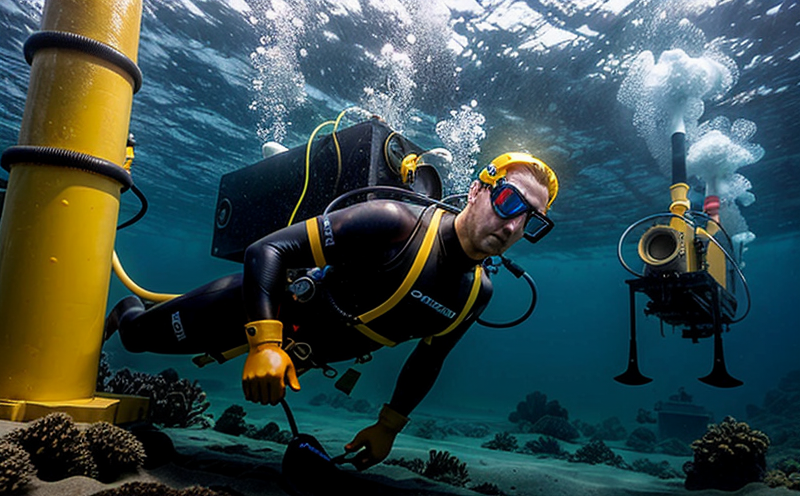API 17H Remotely Operated Vehicle (ROV) Interface Testing
The API Standard 17H establishes requirements and recommendations for remotely operated vehicles (ROVs), which are critical tools in the marine and offshore oil and gas industries. This standard ensures that ROVs are safe, reliable, and capable of performing their designated tasks effectively. The interface between an ROV and its host vessel is a vital component of this safety and reliability.
The primary focus of API 17H ROV Interface Testing is to ensure the proper functioning of the electrical, mechanical, and communication interfaces that connect the ROV with the host vessel. These interfaces are crucial for the ROV's operation, including power supply, data transfer, and control signals. The test procedures outlined in this standard aim to validate these interfaces under various operational conditions.
The testing process begins by preparing the ROV according to specified guidelines, ensuring all components are clean and free from any defects that could affect performance. Once ready, the ROV is connected to a host vessel equipped with appropriate test fixtures designed to simulate real-world operating scenarios. The interface connections are then tested using specialized equipment capable of measuring electrical resistance, signal integrity, and mechanical stress.
During testing, various parameters such as voltage levels, current flow, and communication protocols are monitored closely to ensure they meet the specified limits defined in API 17H. Any deviations from these standards could indicate potential issues that need addressing before deploying the ROV in operational environments. Additionally, mechanical tests may be conducted to assess the durability of connectors and other components under simulated loading conditions.
The results of the API 17H ROV Interface Testing are meticulously recorded and analyzed by our experienced engineers who possess deep knowledge of both marine engineering practices and relevant standards like those set forth in API 17H. This rigorous evaluation process ensures that only fully compliant systems leave our facility, providing peace of mind to clients regarding their investments.
Our laboratory adheres strictly to current industry norms when performing these tests ensuring compliance with not just national but also international regulations such as ISO/IEC 17025. This certification guarantees the accuracy and reliability of all test results produced within our premises.
In summary, API 17H Remotely Operated Vehicle Interface Testing plays an essential role in safeguarding lives at sea by guaranteeing that all necessary interfaces function correctly before deployment into challenging environments. By adhering to this stringent testing protocol, we help maintain operational efficiency while minimizing risk associated with improper functioning of these critical pieces of equipment.
Why It Matters
The importance of proper ROV interface testing cannot be overstated. In marine operations, where precision and reliability are paramount due to the harsh conditions often encountered, any malfunction or failure can have severe consequences ranging from increased downtime to costly repairs or even environmental damage.
ROVs play a crucial role in exploration activities such as hydrocarbon production, installation of subsea infrastructure, decommissioning projects, and scientific research missions. They must interface seamlessly with various vessels carrying them into designated areas where they will perform their assigned tasks. A well-executed API 17H ROV Interface Test ensures that these interfaces are functioning optimally under all expected conditions.
Failures in the electrical or mechanical aspects of an ROV's connection could lead to power outages during critical operations, loss of data integrity compromising safety protocols, or damage to both equipment and personnel. By conducting thorough tests based on API 17H guidelines, we can identify potential problems early on, preventing costly mistakes later down the line.
Moreover, compliance with these standards demonstrates a commitment to quality assurance which enhances trust among stakeholders including clients, regulatory bodies, insurance providers, and employees alike. It fosters an environment conducive to innovation and continuous improvement within your organization's marine operations.
Industry Applications
- Exploration & Production: Ensuring reliable communication between ROVs used for drilling, well completion, and production activities and the mother vessel.
- Decommissioning: Verifying that all necessary interfaces are functioning correctly to safely remove old structures from the seabed.
- Research & Environmental Monitoring: Guaranteeing accurate data transmission for scientific studies conducted using ROVs in diverse aquatic environments.
- Installation of Subsea Infrastructure: Testing the integrity of connections during the placement of pipelines, cables, and other large components on the seafloor.
Eurolab Advantages
At Eurolab, we pride ourselves on providing comprehensive API 17H ROV Interface Testing services that cater specifically to your unique needs. Our team of highly skilled professionals has extensive experience in this field and stays abreast of the latest developments within the marine industry.
We offer a range of testing solutions tailored to meet various requirements, from basic interface checks to complex multi-parameter evaluations. Our state-of-the-art facilities equipped with cutting-edge instrumentation ensure that every test conducted meets or exceeds international standards like ISO/IEC 17025.
Our commitment to excellence is reflected in our dedication to maintaining high levels of accuracy and repeatability throughout the testing process. We provide detailed reports complete with recommendations for improvements where necessary, ensuring you have all the information needed to make informed decisions regarding your ROV interfaces.
To summarize, choosing Eurolab for your API 17H ROV Interface Testing needs means benefiting from our expertise, cutting-edge technology, and unwavering commitment to quality. Partner with us today to ensure the highest standards of performance and reliability in your marine operations.





